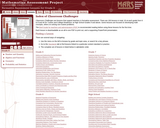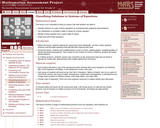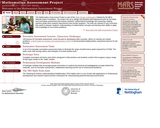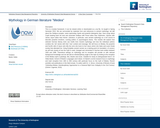This is a module framework. It can be viewed online or downloaded as a zip file.
As taught in Spring Semester 2010.
We are surrounded by materials from and references to ancient mythology: we talk about the Oedipus-complex, name spaceships Apollo and powerful detergents Ajax, have songs about Cupid drawing back his bow and associate Oedipus with Freud rather than Sophocles, Ulysses with James Joyce rather than Homer. Literature, in particular, uses ancient mythology as a rich source to describe powerful emotions, cunning politics or psychological drama.
This module will explore how selected German literary texts use motifs from Ancient mythology and how the individual authors combine the ‘old’ stories with their ‘new’ content and message. We will focus on Medea, the powerful and horrific wife of Jason who kills the sons she loves to hurt Jason whom she hates and scare Greek society that alienated her. Using Euripides ancient version as a starting point (in translation, of course,) we will look closely at how the myth is used, changed and reinvented in German texts written between 1926 and 1998.
Theoretical writings on mythology and its reception will provide us with relevant background knowledge and we will add an interdisciplinary angle to the topic by looking at the reception of the Medea myth in paintings, film, theatre and music.
Suitable for study at undergraduate level 4.
Dr Heike Bartel, School of Modern Languages and Culture.
Dr Bartel's current research focus is mythology and myth reception from 18th to 20th century with particular focus on the myth of Medea. Recent activities and publications in this field include: Co-editor (with Dr. A. Simon, University of Bristol) of book 'Unbinding Medea: Interdisciplinary Approaches to a Classical Myth from Antiquity to the 21st Century' (Oxford: Legenda, 2010).



